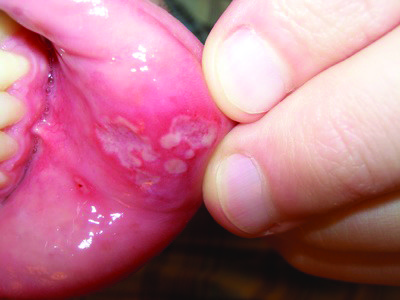Periodic Fever, Aphthous Stomatitis, Pharyngitis, and Cervical Adenitis (PFAPA) – aka Marshall Syndrome
Acronym:
PFAPA
SAID group:
Idiopathic
Gene:
Currently unknown. No genetic testing available.
Inheritance:
Currently unknown.
Ethnicity:
Affects all races. [40]
Frequency:
Unknown. PFAPA is the most common non-infectious recurrent fever disorder. [40]
Timing of symptoms:
Periodic fevers and symptoms lasting 3-6 days, recurring every 21-28 days. Extremely predictable frequency of days between the onset flares in most cases. Patients are symptom-free between flares. No specific triggers have been identified–flares come at regular intervals, often monthly. [40] If there are any persistent symptoms between flares, evaluation for autoinflammatory periodic fever syndromes is essential.
Age of onset:
Early childhood, usually between 2-5 years of age. A few adult-onset cases are documented. Most teens outgrow it. [40]
Skin cutaneous:
Aphthous ulcers (stomatitis), and pharyngitis with exudate, (but no infection) is a classic finding. [40] [41] Skin rashes are not typical, or a part of the PFAPA diagnostic criteria-if rashes occur with flares, or are persistent between flares, other autoinflammatory diseases should be considered.
Neurologic:
High fevers for 3-6 days, with chills and malaise. Some patients have headaches with flares. Other neurological symptoms are not noted. [41]
Auditory:
Not noted. [40] [41]
Ophthalamic:
Not noted. [40] [41]
Cardiopulmonary:
Flares of fevers, stomatitis and pharyngitis are not associated with respiratory illness. [40] [41]
Abdominal:
Abdominal pain, and diarrhea are often present with flares. [40] [41]
Lymphatic:
Cervical adenopathy or lymphadenopathy during flares. [40] [41]
Joints bones muscles cartilage:
Arthralgias, fatigue and malaise. No permanent joint or bone issues noted, and patients are symptom-free between PFAPA flares. [40] [41]
Vasculitis:
Not noted. [40] [41]
Amyloidosis:
Not noted. [40] [41]
Abnormal labs:
High: ESR, CRP, WBC during flares only. All normal labs when not flaring, or between flares. [40] [41] IgD may be elevated in patients with PFAPA (and these patients were negative for MVK mutations). [126] PFAPA symptoms overlaps with a number of other autoinflammatory periodic fever syndromes, so genetic testing and attention to clinical findings may be helpful.
Search Keywords:
Periodic Fever Aphthous Stomatitis Pharyngitis Cervical Adenitis, PFAPA, Marshall Syndrome, periodic fever, recurrent fever, periodic fevers, recurrent fevers, predictable fever, predictable flare, cyclic fever, cyclic flare, mouth ulcers, mouth sores, apthous ulcers, aphthous stomatitis, stomatitis, pharyngitis, enlarged lymph nodes, adenitis, exudate pharyngitis, abdominal pain, diarrhea, adenopathy, lymphadenopathy, cervical adenopathy, arthralgia, fatigue, IgD, elevated IgD, fever, oral ulcers,

Photo credit:
Dr Paulose drpaulose.com; http://blog.timesunion.com/mdtobe/medical-mystery-monday-125-the-case-of-the-recurrent-fevers/3123/
Resources:
A collection of PFAPA research studies, including a helpful patient guide about PFAPA by Dr Beata Wolska is listed on our saidsupport.org blog.
A review of the literature and findings comparing PFAPA vs HIDS is also on our saidsupport.org blog.

